
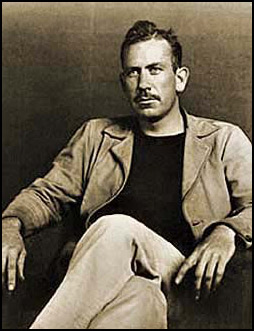
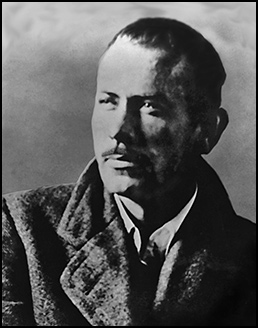
"Please ask [the publisher] not to give my address to anyone. I'm scared to death of popularity. It has ruined everyone I know . . .
I suppose it is bad tactics but I am refusing the usual things - the radio talk shows, the autograph racket, the author's afternoons and the rest of the clutter - politely, I hope. But firmly."
We don't think he'd be on Facebook or Twitter . . .
In a similar way, we want to share an interview with you that we had with Herb Beherens, a volunteer at the National Steinbeck Center in Salinas, California. Herb has devoted years to better understanding this remarkable writer, and he told his Steinbeck stories with great fondness, intimacy and knowledge. Herb shared Steinbeck's advice to a young writer with bad reviews, some wisdom for us all:
"Writing is the best revenge."
|
Location: |
Salinas, California |
|
|
Run time: |
29.50.06 |
|
|
Genre: |
Fiction, non-fiction |
|
|
Website: |
||
|
Raised: |
Salinas Valley |
|
|
Youthful influence: |
His mother, Olive, a former schoolteacher. |
|
|
Influential books: |
The classics, the Bible, Pilgrims Progress, myths and fairytales and the Oxford English Dictionary. |
|
|
Literary Habit: |
He wrote constantly by hand and with a typewriter, and he sometimes used a Dictaphone. |
And that began my obsession with America’s most powerful writer. An author who writes so easily, so flawlessly, that you are easily lulled into believing it is your own mind spinning the words into golden threads of stories about people like you and me, only living on the edge, or struggling to survive, or giving their best to maintain their dignity and valor and direction.
It’s no wonder that this writer won the Nobel for Literature, a Pulitzer, and so many other awards. And, it’s no wonder he never expected any of these. He was a modest man who simply wanted to share his stories with people.
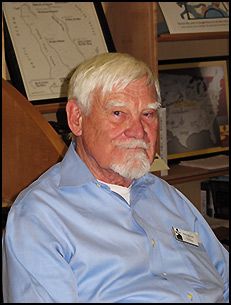
Herb Beherens, Volunteer Archivist and
John Steinbeck expert
It’s embarrassing, but I (George) must make a confession about this latest interview.
You see, I hated John Steinbeck. I knew he was a hack writer, a poser, a simple-minded artichoke-eating phony. I knew this because I grew up in the same area as he, and no one who grew up in my own area could amount to a hill of beans. So, despite a life of reading the classics and greats, I never read a word of his scribbles.
And then a few years ago I was driving through Portland on a sunny summer day when I heard the opening paragraph to Cannery Row read on NPR in recognition of the 50th Anniversary of Doc Ricketts' death. I was stunned. It was a paragraph as powerful as the opening of A Tale of Two Cities. I immediately drove to Powell’s Books and bought a copy.
Interview Movie
(Embedded version below)
MP3 Audio File
(Note: To download the podcast,
right click on the link if you are on a PC,
or control click if you are on a Mac. )
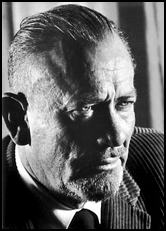
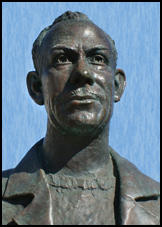
John Steinbeck, 1902 - 1968.
Awards & Honors
California Commonwealth Club Gold Medal Awards for Best Novel - 1936, Tortilla Flat; - 1937, In Dubious Battle
New York Drama Critics' Circle Award - 1938, Of Mice and Men
Pulitzer Prize - 1940, The Grapes of Wrath
Academy Award nominations* - 1944, Lifeboat - story; - 1945 A Medal for Benny - story, with Jack Wagner; - 1952 Viva, Zapata! - story and screenplay
King Haakon Liberty Cross - Norway - 1946, The Moon is Down
Member of the American Academy of Arts and Letters - 1948
Nobel Prize for Literature - 1962
United States Medal of Freedom - 1964
Trustee of John F. Kennedy Memorial Library - 1964
Annual "Paperback of the Year" Award - 1964
Press Medal of Freedom - 1964
Member of the National Arts Council - 1966
Commemorative Stamp issued by USPS - 1979
American Arts Gold Medallion issued by US Mint - 1984
Named #1 on the "Top 100 Writers of the 20th Century" by Writers Digest - 2000
*Note: Adaptations of Steinbeck stories garnered nearly 30 Academy Award nominations and the films have won four Academy Awards.
Books (partial)
Cup of Gold (1929)
The Pastures of Heaven (1932)
To a God Unknown (1933)
Tortilla Flat (1935)
In Dubious Battle (1936)
Of Mice and Men (1937)
The Red Pony (1937)
The Long Valley (1938)
The Grapes of Wrath (1939)
The Sea of Cortez (1941)
The Moon is Down (1942)
Cannery Row (1945)
The Pearl (1947)
The Wayward Bus (1947)
East of Eden (1952)
Sweet Thursday (1954)
The Winter of Our Discontent (1961)
Travels with Charley (1962)
America and Americans (1966)
The Acts of King Arthur (1976) Ed. Chase Horton



